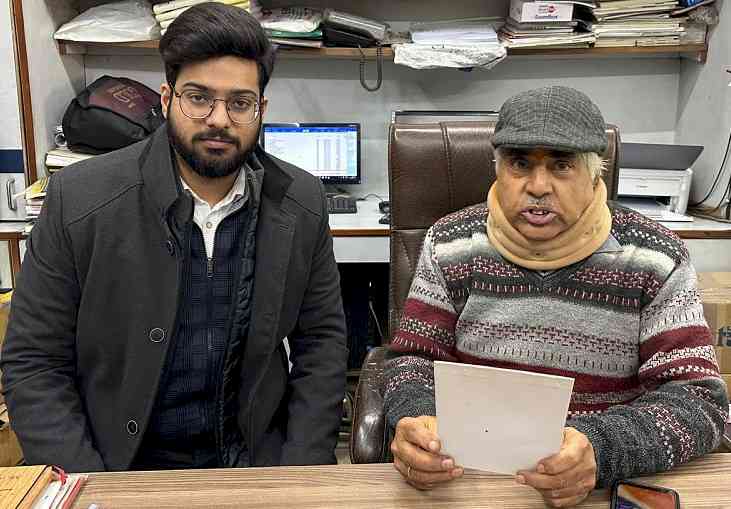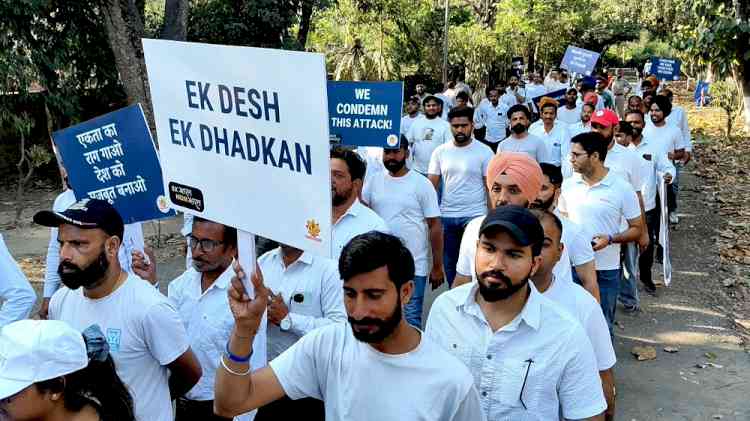PPBM holds meeting regarding Union Budget FY2025-26
A meeting was held at the main office of the Punjab Pradesh Beopar Mandal (PPBM) located at Mata Rani Chowk, on Friday, regarding the new fiscal year’s budget to be presented by Union Finance Minister Nirmala Sitharaman on February 1.

Ludhiana, January 24, 2025: A meeting was held at the main office of the Punjab Pradesh Beopar Mandal (PPBM) located at Mata Rani Chowk, on Friday, regarding the new fiscal year’s budget to be presented by Union Finance Minister Nirmala Sitharaman on February 1. The meeting was attended by State General Secretary and member of the National Trade Welfare Board Sunil Mehra, along with General Secretary Ayush Agarwal.
These trade leaders stated that traders and businessmen were ignored in the previous financial budget, and this year too, traders and businessmen have high hopes from the budget, as they do every year. They emphasized that Punjab should not be neglected by the central government this time. Like Jammu & Kashmir, Himachal Pradesh, and Uttar Pradesh, Punjab should also be given a special economic package. Being a border state, Punjab has suffered a loss of at least ₹6 lakh crore in trade and business over the past few years due to protests and the state’s law and order situation. Investments worth more than ₹2.5 lakh crore have shifted out of the state, and investments within the state has decreased by 85%, while the nation as whole have received investments exceeding 65%. This fact was even acknowledged by Nirmala Sitharaman during her Lok Sabha election campaign in Ludhiana last year.
According to these leaders, during the farmers’ protest, the state faced a trade loss of ₹4 lakh crore, and Ludhiana, the hub of industry and trade, alone suffered a loss of ₹1 lakh crore. Poor law and order, combined with the state borders being blocked by farmers, have made it difficult for goods and traders to enter the state. As a result, traders, industrialists and businessmen in Punjab have had to pay an additional ₹100 crore every week to transport goods.
The leaders also mentioned that for the past year, the central finance minister has been approached regarding the issue of Section 43B(h) of the Income Tax Act, and they hope for a resolution in this budget. This rule has made it challenging for small traders and MSMEs to take orders from large companies due to the 45-day payment limit, which acts as a constant pressure on them.
The trade leaders also expressed concerns about online trade. According to them, the opposition to online trade stems from the lack of a pricing policy. Large companies like Amazon and Flipkart purchase low-quality goods in bulk and sell them to customers at rates lower than the market price. Once customers become accustomed to this, these companies suddenly raise prices to exploit them. The leaders suggested that a law should be enacted to prevent online retail giants from selling products below market rates. There are 8 crore traders across the country who provide employment to 25 crore people. Due to the lack of price regulations in online retail, it has become difficult for small traders to survive in the market.
These leaders also said that changes in import regulations are expected this year. They have urged the government to impose anti-dumping duties on goods that can be manufactured domestically but are imported rapidly from countries like China, Bangladesh etc. Major example of this is the cycle parts and yarn which ultimately leads to unemployment in our country and Punjab is already having twice the unemployment rate as compared to national data. Such move would strengthen domestic trade and enable Indian traders to compete both nationally and internationally.
They also said that there is need for simplification in GST return filings and rules. They expect that there should be automatic filing of GSTR-1 for assesses falling under e-invoice as GSTIN has every record of per day sales. They strongly opposed the recommendation of Group of Ministers regarding brining 28% GST on clothes valuing above ₹10000 as clothes are not luxury but a necessity.
They also demand for reduction in GST rate for cycles to 5% as cycles are part and parcel for lower middle class and labour class population for their regular transport and should attract less GST as it corresponds to the necessity category and not semi luxury or luxury category.
Punjab’s traders have high hopes for a special package from the Modi government this year. The state, burdened with a debt of ₹3.75 lakh crore, has witnessed over ₹3 lakh crore of trade shifting out of the state. Its annual GST collection is limited to ₹21,000 crore. Once known as “Rangla Punjab,” it has now fallen to the 19th position. More than 6 lakh youths have left Punjab for other states and countries. The central government must focus on saving such a state.


 City Air News
City Air News 










